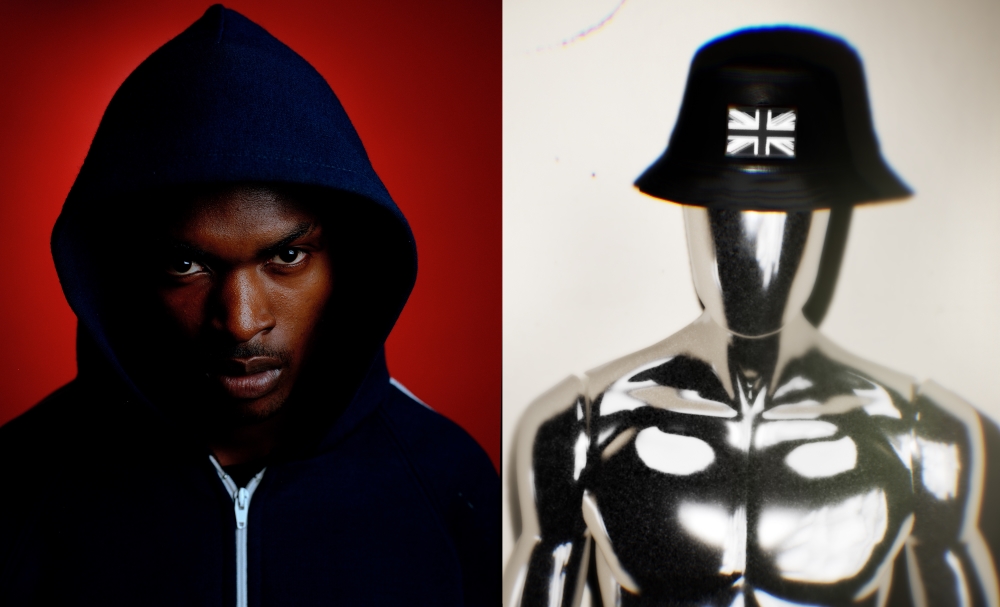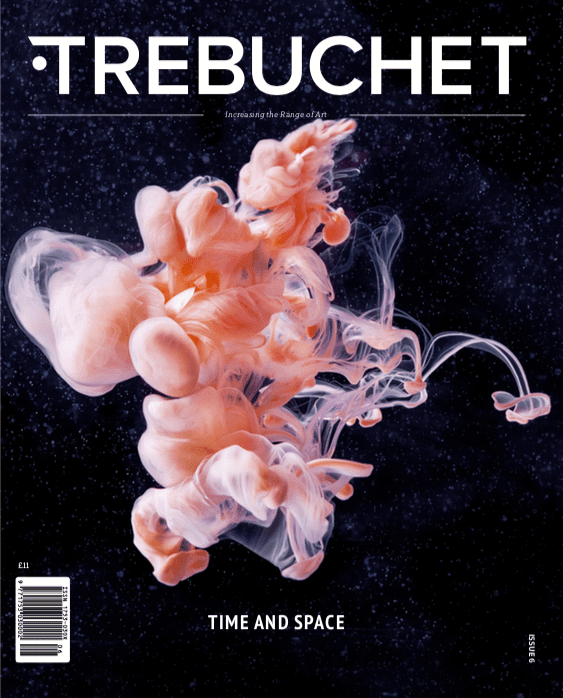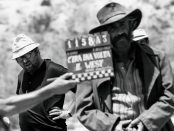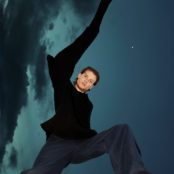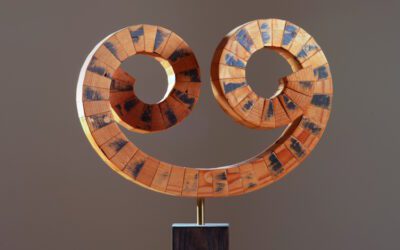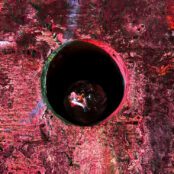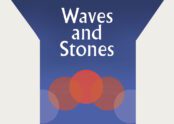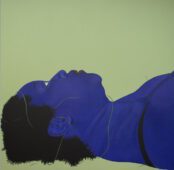[dropcap style=”font-size:100px; color:#992211;”]T[/dropcap]he strained relationship between popular music and high art has always been most entertaining when it fails, when grand pompous gestures fall flat, when deconstructive techniques are shoehorned into pop formats or when the epic become tawdry.
We love those moments because they agree with our prejudices that they shouldn’t mingle and that however high the fence of elitism is, we’re definitely on the right side.
What we often gloss over is how often and how easily the two camps come together for the success, acclaim, and profit of all involved. If there is anything less unexpected, controversial or transgressive than the collusion of aspirational capital and celebrity in poptastic high art it’d have to be our pearl-clutching astonishment at the news of any feted collaboration.

Actress at Southbank Centre
The interplay between canon and the contemporary is a media trope that we all know well, from Jane Austen (Pride and Prejudice and Zombies) to Shakespeare (passim), even the gnat’s remembrance of childhood movies remade for the next generation. Adaptation at its best can produce a recontextualisation that reveals new aspects of a well known, even seminal work like Soft Cell’s 1981 cover of Gloria Jones’ 1964 “Tainted Love”. At its worst, well… let’s put Marilyn Manson’s 2001 version behind us.
The distinction between the work of electronic musician and Wolverhampton native Actress (Darren Cunningham) and that of influential German composer Karlheinz Stockhausen (1928–2007) isn’t as extreme as their respective origins might suggest. Actress has continually pushed the structural aspects of his music with each release and on Lageos (2018), recorded with the London Contemporary Orchestra, he reached a critical and artistic zenith by successfully fusing classical and electronic elements. He often juxtaposes familiar elements and it’s almost a signature feature that different elements never blend in his productions. For example, classical and techno elements might sit together with a sort of cocky acknowledgement of the other, never explicitly working together but always meeting and moving forward to key dynamic moments within each composition or track depending on your persuasion.
As a label founder (Werkdiscs) and visual artist Actress has worked in a variety of fields and his ambition looks to culminate with a total—visual, theatrical and sonic—interpretation of Stockhausen at the Royal Festival Hall in May 2019.
but if you listen to them as a millisecond noise, they’re completely different
Joined on stage by Lageos cohort Robert Ames and utilising his artificial intelligence project, Young Paint, Actress will rework Stockhausen’s “Welt-Parlament” (1995, part of Mittwoch aus Licht). The performance “features recordings of two specially arranged debates on the subject of love involving members of the UK Parliament. Actress and his AI ‘sprite’ plan to manipulate these pre-recordings live over a performance arranged by Ames, in a multidisciplinary conversation about the transcendent nature of love in a country striving to assert boundaries”. (Event blurb Southbank 2019)
Speaking to Trebuchet prior Actress explains approaching the commission and how he used concepts of time, space, compression and dialogue to describe love.
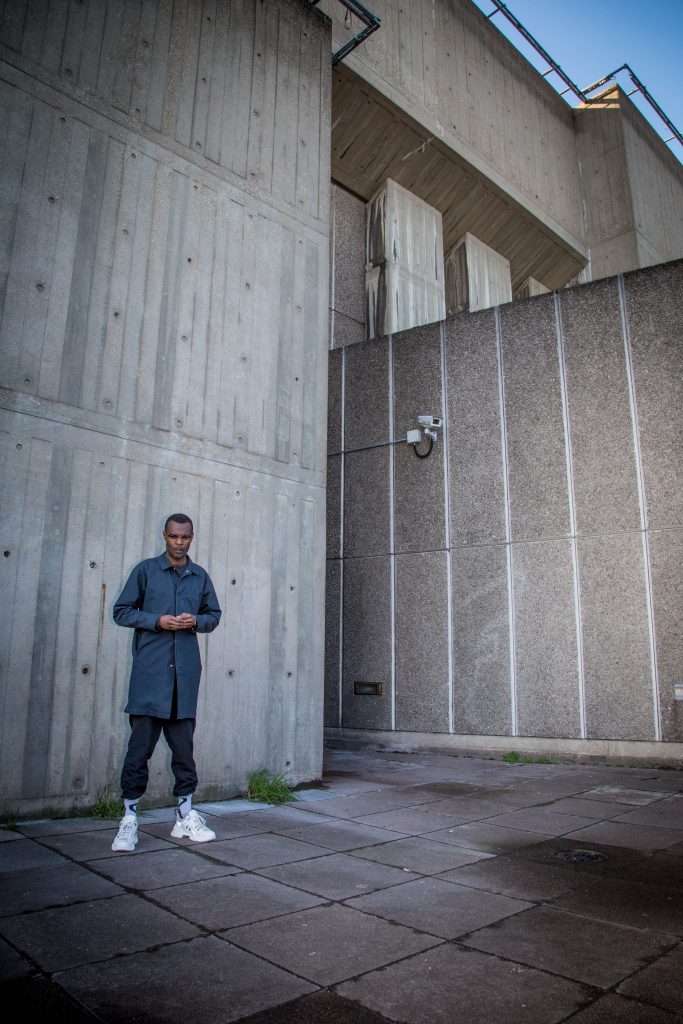 “When I went to the archive to meet the guardians of Stockhausen’s estate, they were definitely interested as to reasons why I chose “Welt-Parlament”. That particular opera presented itself as something that could regenerate itself quite easily.
“When I went to the archive to meet the guardians of Stockhausen’s estate, they were definitely interested as to reasons why I chose “Welt-Parlament”. That particular opera presented itself as something that could regenerate itself quite easily.
It was quite a visionary piece and particularly for the current political climate, it seemed to be the most applicable opera to do at this moment in time.
“[I feel] honoured and privileged to look at the work that he did. The composition I’m doing started back in ’94 and there’s still archives that were ’97 and even going further, so it was a composition that he was making over a long period of time. If I apply that to the way I make music these days and all my contemporaries, things are so fast. The rate of turnover in music goes so quick. So it’s quite interesting. He talked a lot about condensing ideas and expanding ideas, and these are the sort of things I want to apply to music today.
“So rather than listening to a Mozart piece and hearing the full trajectory over the course of time, what if we really condense that to its smallest fragment and just listen to that as one sound? He was applying the sound of Mozart, condensed, to the sound of Schubert, condensed. Even when you listen to them as a full piece, they’re different, but if you listen to them as a millisecond noise, they’re completely different. So in terms of scaling things down on that level, it really gives you an insight into the sort of thing that he thought about in terms of music. How you can apply that to what it is I’m doing, this particular opera was made over the course of probably a decade, and I have about three months to put together a reinterpretation and it’s probably going to last about 60 minutes. And I’ve been once to his archives, so it’s a lot of information to condense into one piece.
Actress: Completing the piece
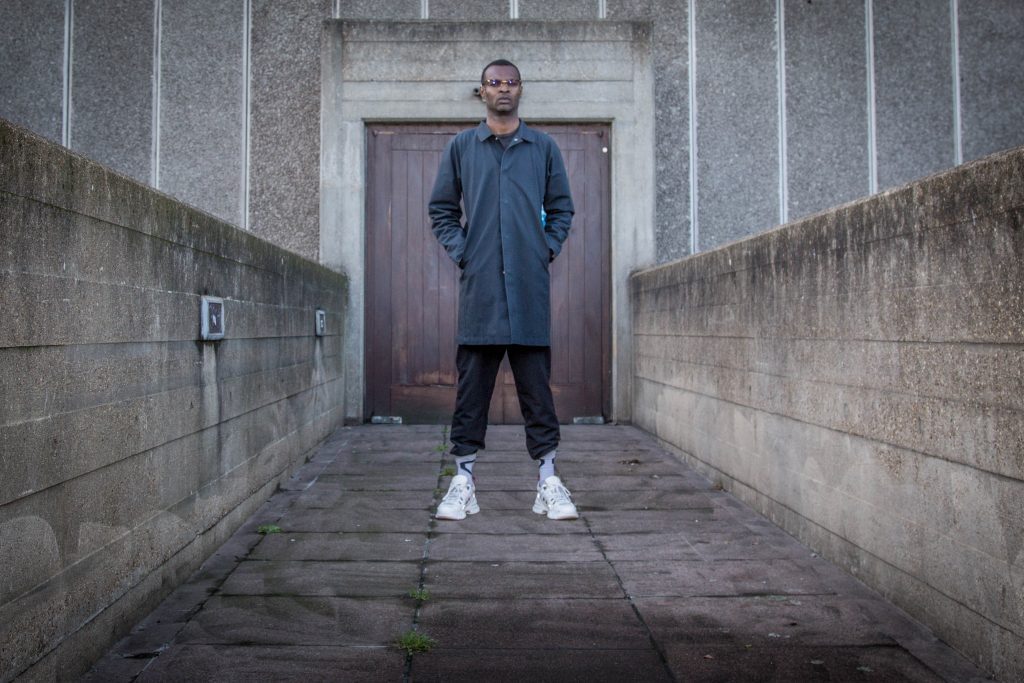
Actress at Southbank Centre
“It’s never going to be finished; you’re always making changes, even on the day. I think ultimately, with him, when you say direction or interpretation or instruction, I think more it’s instruction. There’s lots of instruction in his music for other people, composers and artists, to take it to a different level. He says this in a lot of the things that he writes; even though he came up with a comprehensive idea that he was satisfied with, there were always other things that he wished he could have applied to it. I think he left a lot of his compositions quite open-ended and open-sourced for artists to reenter his work and take it in a new direction. That’s why I’m focusing on this idea of condensing and expanding. Steve Reich spoke a lot about that in the essays he wrote as well, so it seems to be a recurring theme amongst that type of composer.
“I’ve written parts for piano; there is no piano in the original piece. I wanted there to be some sort of symbolism in relation to the debate in parliament that is part of the opera, and in terms of the opera itself, I wanted that to be documented. The best way that I’ve felt as self-documentation is to have the piano play it, to be considered a stenographer.
it’s a lot of information to condense into one piece.
So that was symbolic and visual for the audience, and that allows us to invite Vanessa Benelli Mosell on the piano. So there’s all these aspects that I’m thinking about, and I was looking at Klavierstücke just to see how he approached piano work as well. Even though I am focusing on the opera I’ve been commissioned to do, there’s going to be points where I’m going to want to depict what he was doing in other operas and how he got to this particular piece from there.
Actress: Visuals and conception
“My head is mostly always in the clouds to some extent and I’m making music every day. My outlook is always quite visual in a sense, so this particular piece offered that visual doorway for me: okay, parliament, okay, current climate. The first thing I thought was I need this piece to generate those ideas, so what if I try to see if I can get access to some MPs to present the idea of love to them. I’ve recently read Plato’s Symposium, which is a similar concept in that Plato talks about Socrates, and the two get together and debate about love. In a romantic sense, I wanted to try and do that with our members of parliament or the people who are forebears of power. The idea was to record the debate and whatever came out for that to inform the libretto. So instantly it becomes something that is placed in the current time, and it has clarity in that sense, so it gives clarity to the music; it sort of fundamentally anchors the music. So it is an incremental thing that occurs over a period of time.
Actress: EU and a new language of love
“There’s aspects of it which will feed into the EU debate, because that’s where a lot of the politicians’ heads are at, particularly in the UK. But we give the debates in Holland as well; we went to the Dutch parliament and did a parallel debate, and it was interesting, the nuances and how different they were to the UK. We did broach Brexit and all this sort of stuff. The thing about the opera itself is that it does contain moments which are actually quite funny. So I’m not really the type of person to do something which is completely safe or anything. It’s meant to be a fantasy as well, it’s meant to be a science fiction. The actual name is supposed to be indecipherable as well. So there’s loads of things about the opera itself which I like to work with.
“Through the workshop, I knew what Stockhausen was working with, and he gave instruction for an international phonetic system. So he was saying, I’ve created this piece, but it is based on the international phonetic system, so if you have any ambition to reproduce this for a different tone, language or whatever, then you should use the international phonetic system to base your lyrics or text on. That to me is a clear, straightforward instruction. I’d already written the hymn, so it wasn’t like there was direct instruction from me; it was more like, how can this be interpreted, and we found a way. It was just by chance, in my opinion, that it connected to part of the debate. When something like that happens, you just put a tick next to it and go okay, that’s a bona fide idea and it works.”
Actress x Stockhausen Sin {x} II – 14th May 2018 – Royal Festival Hall – Tickets
Main image: Actress Album, All others © Pete Woodhead
Read more about Time and Space in Trebuchet 6
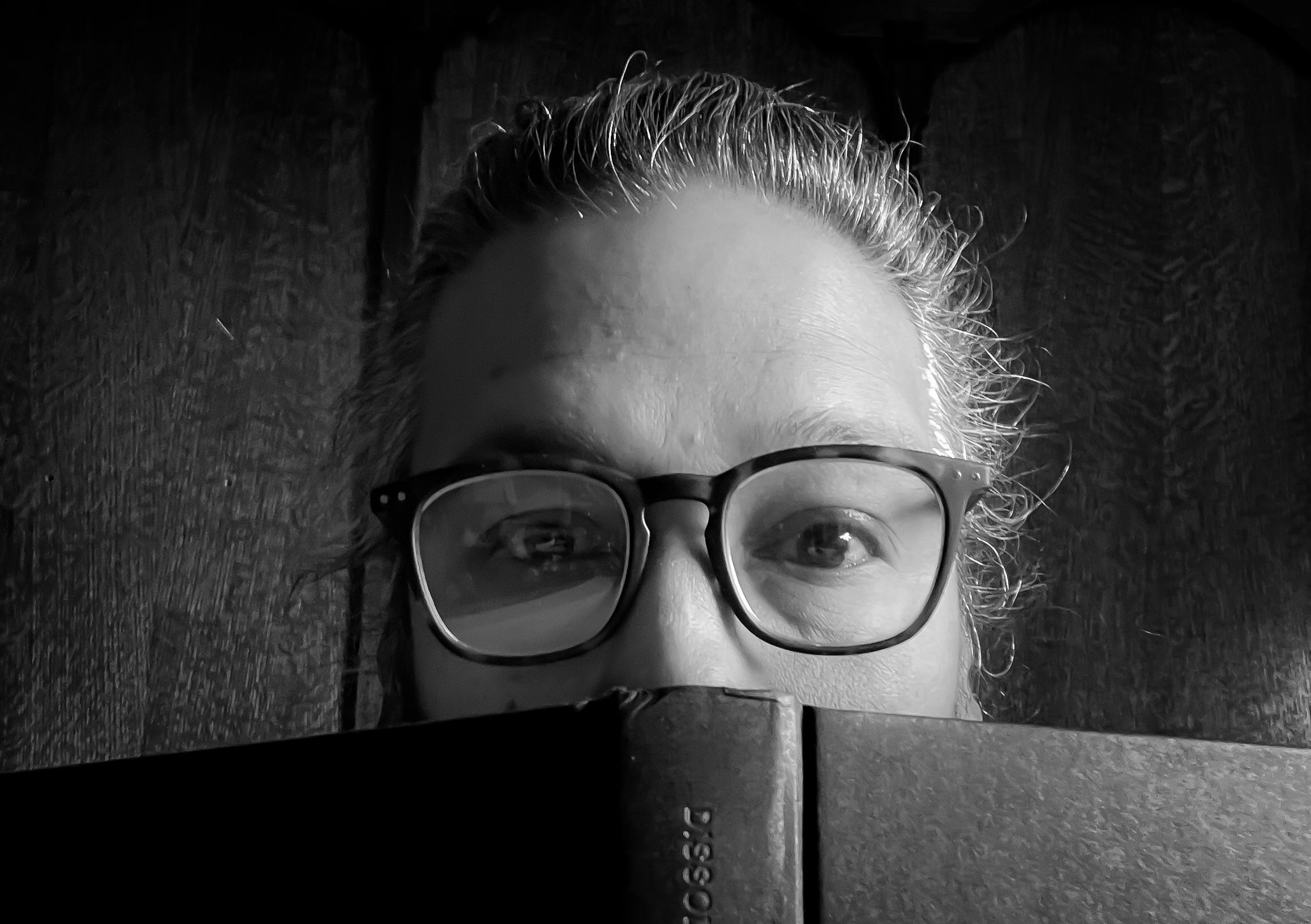
Ex-London based reader of art and culture. LSE Masters Graduate. Arts and Culture writer since 1995 for Future Publishing, Conde Nast, Wig Magazine and Oyster. Specialist subjects include; media, philosophy, cultural aesthetics, contemporary art and French wine. When not searching for road-worn copies of eighteenth-century travelogues he can be found loitering in the inspirational uplands of art galleries throughout Europe.

